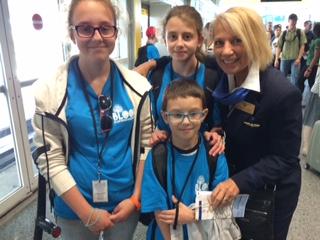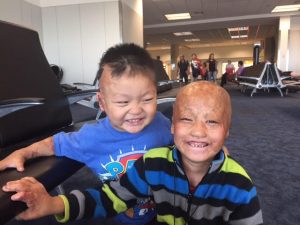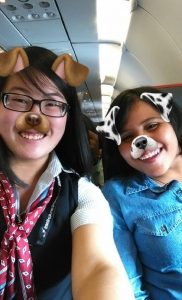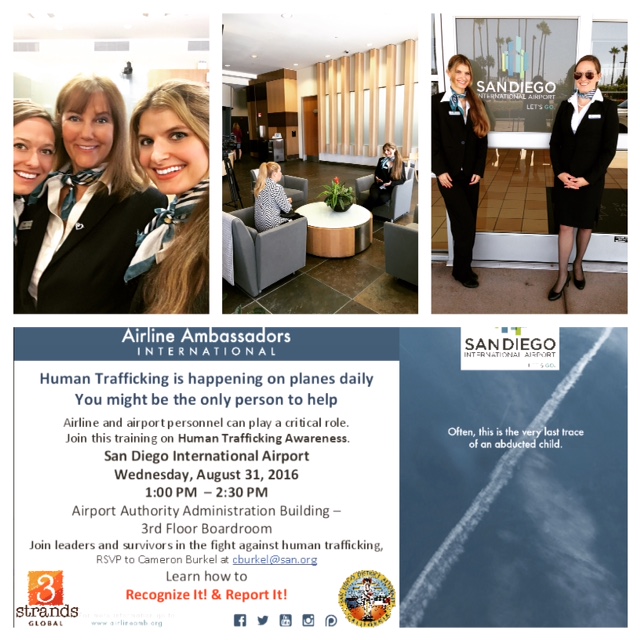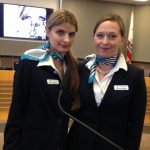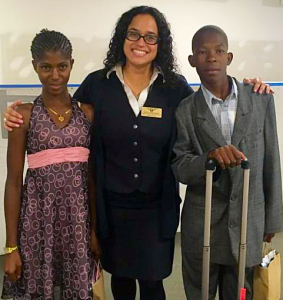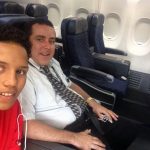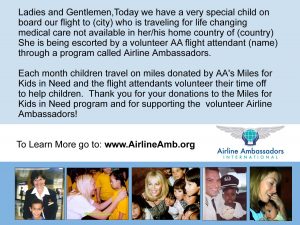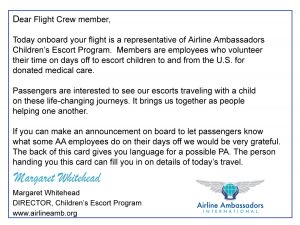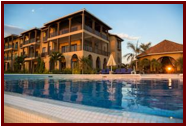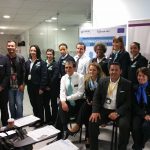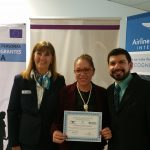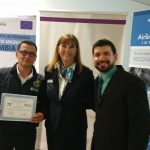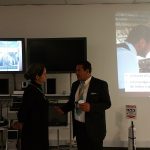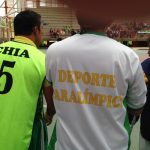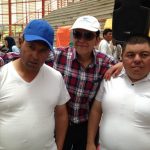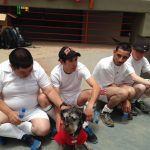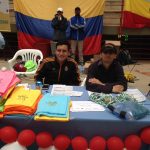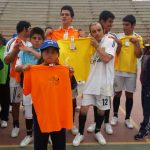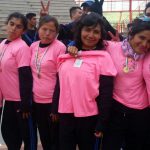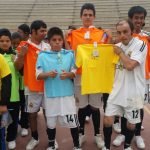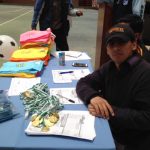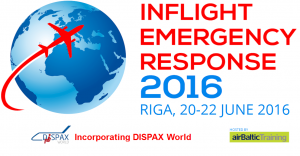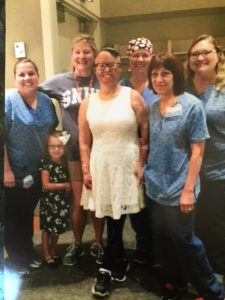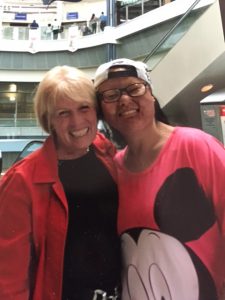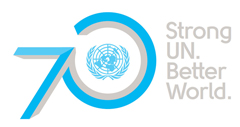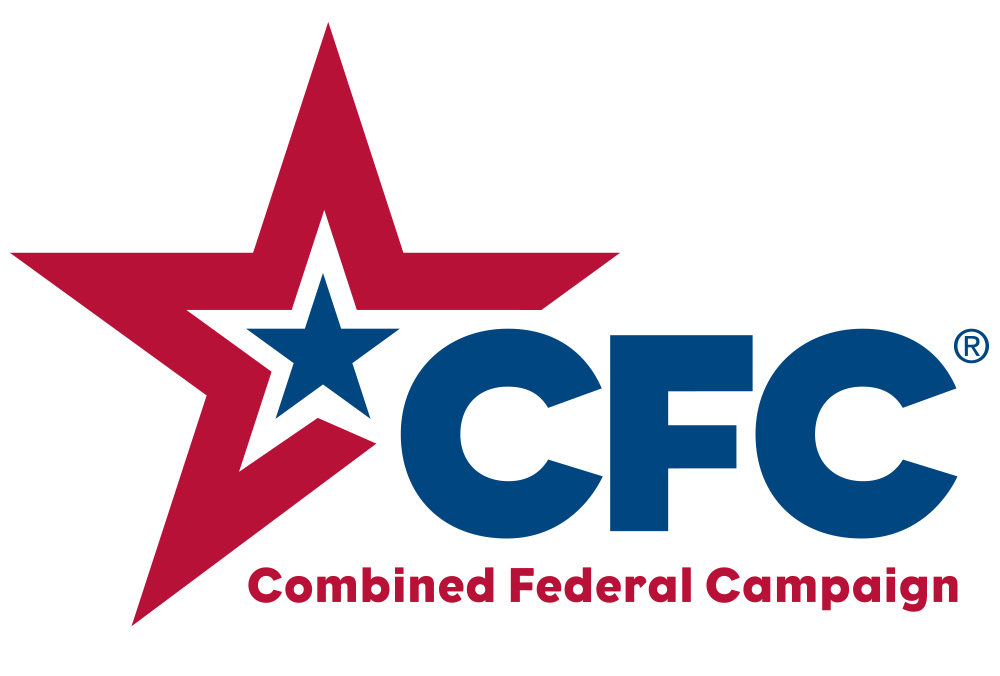But escorts are not always so easy and it takes special sensitivity to deal with these children see pic below of two little boys who had spent a year at Shriners in Days they were escorted on the last leg of their journey by escorted by DFW based Brian Chen:
Fortunately he did NOT take his seatbelt and acted leaving. That stayed for about an hour, I wiped his tears, until he exhausted and I found out keeping playing Disney’s Frozen was the solution to keep him out of the thinking. He then slept until landing. I did not wake them up as they ate on the first meal service, not a lot. Other than the crying, he was behaved good & quiet in flight.
“A key factor in stopping human trafficking is education. With over 20 million passengers passing through San Diego International Airport annually, it’s important that our airport and airline employees have the tools and means to identify victims,” said Angela Shafer-Payne, Vice President of Operations at San Diego International Airport. “Trainings like these are invaluable in helping airports join the fight to stop human trafficking.”
The training in San Diego on August 31 was excellent. Thanks for a warm welcome from Susie Preiser (Airport Emergency Preparedness), Summer Stephan from the District Attorney’s office, Homeland Security and Ashlie Bryant, founder of 3 Strands Global, sponsor of this training and thank you to airport coordinator, Cameron Burkel. The Airline Ambassador team included Nancy Rivard, President, Alicia Kozakeiwicz, survivor, and Claire Dunnigan.
More than 100,000 are children are in danger of being trafficked in the U.S. alone. Globally, there are 20 million victims enslaved today, more than at any other time in history. It is a sad fact that traffickers often use the speed and convenience of commercial air travel.
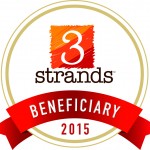 The passage of the FAA Extension Bill requires that every airline in the United States provide enhanced training to flight attendants “recognizing an responding to potential human trafficking victims.” This is also an issue for all airline personnel, as the perpetrators have been commonly found to be involved with drugs, arms and terrorism.
The passage of the FAA Extension Bill requires that every airline in the United States provide enhanced training to flight attendants “recognizing an responding to potential human trafficking victims.” This is also an issue for all airline personnel, as the perpetrators have been commonly found to be involved with drugs, arms and terrorism.
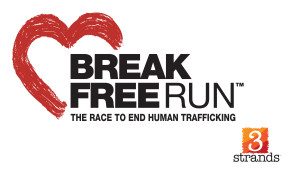 Many thanks to Three Strands Global for support and we are hoping to recruit an airport team to participate in the Break Free Run in San on Sept 17th!
Many thanks to Three Strands Global for support and we are hoping to recruit an airport team to participate in the Break Free Run in San on Sept 17th! 
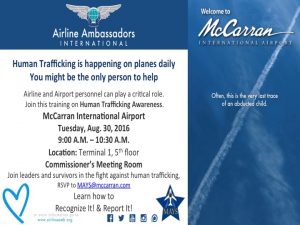
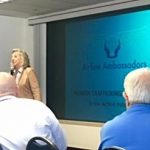 Congresswoman Dina Titus, who launched the Secure our Skies Act this spring, will help kick off this important training at McCarran International Airport.
Congresswoman Dina Titus, who launched the Secure our Skies Act this spring, will help kick off this important training at McCarran International Airport.
Her legislation emphasized the importance of training for flight crew to fight this horrific crime. The passage of the FAA Extension Bill requires that every airline in the United States provide enhanced training to flight attendants “recognizing an responding to potential human trafficking victims.”
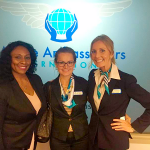 This is also an issue for all airline personnel, as the perpetrators have been commonly found to be involved with drugs, arms and terrorism. We acknowledge leadership of McCarran airport in taking a lead on this issue.
This is also an issue for all airline personnel, as the perpetrators have been commonly found to be involved with drugs, arms and terrorism. We acknowledge leadership of McCarran airport in taking a lead on this issue.
Over 200 people attended this training learning how to recognize and Report Human Trafficking Many thanks to Skywest pilot Kevin Jones, who came up with a 7 step formula to remember our procedure These seven steps could lead to FREEDOM:
1. F – Get a FEEL for the situation. Ask questions and evaluate the situation.
2. R – REPORT / RELAY your concern to other F/A, ground gate agents.
3. E – ENGAGE young individual and the couple in polite typical conversation
4. E See if the make EYE CONTACT with you or with each other
5. D – DESCRIBE DETAILS to flight deck, similar to passing information about a medical emergency or disruptive passenger
6. O -After cabin service and passing details to the captain, continue OBSERVING behaviors.
7. M – MAINTAIN control of the situation, MAKE announcements helpful to your cause: seat belt sign on, another beverage/water service for more observation; be slow to open the main cabin door for deplaning if awaiting authorities on the jet bridge.
 Shelia Peters also joined the training as a potential new trainer. Her story was recently featured in UK VHS 1st Class Magazine and a story will be coming out in Ebony Magazine soon. See article on left.
Shelia Peters also joined the training as a potential new trainer. Her story was recently featured in UK VHS 1st Class Magazine and a story will be coming out in Ebony Magazine soon. See article on left.
![]()
 NICARAGUA MEDICAL MISSION Sat Sept 3 – Sun Sept 11, 2016
NICARAGUA MEDICAL MISSION Sat Sept 3 – Sun Sept 11, 2016
HELP THEM HELP THEMSELVES
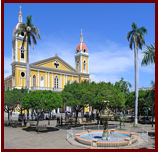 Join us as we return to Nicaragua for our bi-annual mobile medical mission this year. In February our team of medical and non-medical volunteers saw over 700 patients. Airline Ambassadors Kathy Garza and her daughter Cristina also collected supplies that were donated to area hospitals. They also spent time with students at a local school on Saturday.
Join us as we return to Nicaragua for our bi-annual mobile medical mission this year. In February our team of medical and non-medical volunteers saw over 700 patients. Airline Ambassadors Kathy Garza and her daughter Cristina also collected supplies that were donated to area hospitals. They also spent time with students at a local school on Saturday.
Once again we will partner with local doctors and healthcare providers to deliver free medical care including diagnosis, medications, minor procedures, dental care, patient education, as well as referrals to higher levels of care.
ITINERARY
Day 1 Saturday
Arrive in Nicaragua. Prívate transfer Gran Pacifica 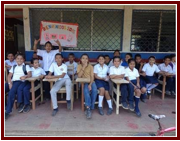
Welcome Dinner
Day 2 Sunday
Group Breakfast and Day Trip to Granada
Enjoy a Guided Tour of the historical city of Granada. Lined with Spanish style houses and beautiful old churches. This delightful town represents the old world charm and character of the past. After lunch take a tour of Lake Nicaragua and Monkey Island. During the evening, enjoy dinner in the city.
Day 3, 4, 5, Monday thru Wednesday
Mobile Medical Clinic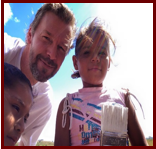
Day 6 Thurs Recharge
Take an organized tour or enjoy a resort activity including: golf, surfing lessons, horseback riding, visit swimming beach or spa treatment.
Day 7 Friday Local Hospital Assistance
Day 8 Saturday Relax
It’s your time to relax and enjoy the resort
Airline Ambassador Casita-House Accommodations Rate on the grounds of Gran Pacifica: $99 per day per person based on double-triple occupancy. Includes lunch and transportation to project. Round trip airport transportation is $98. Does not include 17% resort fee and tax
Ask about our customized travel packages if you need to modify the above itinerary
We are excited to have you join our team.
Your assistance is needed to help triage patients and distribute aid
Donations may include;
Medical Equipment and Supplies/Surgical Equipment
Imaging Equipment
Cancer Treatment Supplies and Equipment
Your donation will support the short and long term goals of this medical mission.
For this trip, you may also want to “pack to do good”
by bringing an extra suitcase of children’s shoes
or school supplies, etc.
For more information email
info@traveltodogood.com or call us at 888-416-7040
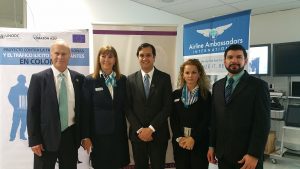 On August 24, 2016 AAI presented the first training on human trafficking awareness at an airport in Latin America. Thank you to American Airlines, UNODC and Migracion Colombia and the Ministry of Interior as well as our training team: Andy Valenzuelas, Marcella Loaiza and Alex Restrepo and coordinator – Camilo Sarmiento.
On August 24, 2016 AAI presented the first training on human trafficking awareness at an airport in Latin America. Thank you to American Airlines, UNODC and Migracion Colombia and the Ministry of Interior as well as our training team: Andy Valenzuelas, Marcella Loaiza and Alex Restrepo and coordinator – Camilo Sarmiento.
On Thursday, Aug 25, the training team visited children in a Special Olympics program and brought supplies to children at Ninos por un Nueva Planeta . We also had meetings at Fundacion RENACER to plan another training and mission in Cartagena. See pics below
 Because of the MidSummer Celebrations only THREE of the orphans were at the Orphanage Vita at Kalnciema 131 in Riga we arrived on June 22, but the orphanage gratefully accepted the 35 colorful shirts to give to the other children upon return. Thank you so much to Angels of Hope!!!
Because of the MidSummer Celebrations only THREE of the orphans were at the Orphanage Vita at Kalnciema 131 in Riga we arrived on June 22, but the orphanage gratefully accepted the 35 colorful shirts to give to the other children upon return. Thank you so much to Angels of Hope!!!
Paul, Nikita, orphans from the Ukraine only spoke Russian, and Melissa was Latvian but spoke some English. All agreed to write letters to new friends in the United States…..sending them to children associated with Women at the Well Transition Center in Atlanta. See below their letters :
Hi Amari,
My name is Melissa and I live in Latvia. I have crazy hair color – it is blue! I speak three languages – Latvian, Russian and English. I am 14 years old and want to be a friend to you!
 Hi Bobby,
Hi Bobby,
My name is Nikita and I live in Latvia. I am 12 years old and I like food, futbol, singing and school. When I grow up I want to ride motorcycles and make fireworks!
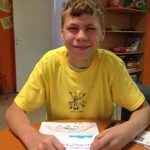
 Hello Andrew,
Hello Andrew,
I want to meet you. I am Russian and want to talk in English when you and I meet in America. When I grow up I want to drive a bus. My name is Paul and I am 13 years old. I live in Riga Latvia and have six siblings – three brothers – three sisters and mom and grandfather. Everyone else is at the beach in Juraaler and I have one prother in Finland
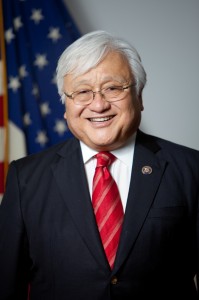 Kudos to Congressman Mike Honda who incorporated this language into the 2016 Transportation, Housing and Urban Development Appropriations (THUD) Bill after reviewing AAI backgrounder below : It augments the Secure our Skies and STOP Act now pending:
Kudos to Congressman Mike Honda who incorporated this language into the 2016 Transportation, Housing and Urban Development Appropriations (THUD) Bill after reviewing AAI backgrounder below : It augments the Secure our Skies and STOP Act now pending:
“Human Trafficking Training for Airline Personnel – Human trafficking is often facilitated by use of commercial air travel, due to its speed and convenience. The Bureau of Labor Statistics reports that there are 108,510 flight attendants in the U.S. who, if properly trained, can help law enforcement properly identify suspected victims and traffickers to intercept and restrict the movement of these criminal networks. The Committee is concerned about the limited efficacy of current online training for airline personnel and encourages the FAA to explore broad expert training for airline training staff at each major airline in the United States, which would include participation from trafficking survivors to help better understand the needs of victims. “
AAI White Paper Below
Background
Human Trafficking is a multi-billion dollar business and traffickers move their victims frequently to keep them powerless. They often use the speed and convenience of commercial air travel. Airline flight crews, if properly trained, could become thousands of eyes and ears providing critical intelligence to law enforcement on potential trafficking situations. Legislation to require airlines to train staff is pending and could be made most effective by providing resources for live trainings on human trafficking to training staff of all 12 U.S. based airlines and 27 regional airlines.
Because air transport has the highest vulnerabilities among critical infrastructures, the urgency of effectively addressing this issue is evident. Traffickers also have interests in other high crimes that effect aircraft safety issues (drugs, weapons, terrorism, et al.)
The Secure our Skies Act of 2016 (HR 4430) and the Stop Trafficking on Planes (STOP) Act S 2642 require airlines to train front line employees on human trafficking specifically using the Blue Lightning protocol. Blue Lightning initiative launched in June 2013 by DHS, DOT and CBP to train airline personnel to identify potential trafficking situations and report their suspicions to federal law enforcement. It provides an on line training and training materials. Three airlines have signed an MOU to provide the on line training to employees – Delta, JetBlue and Silver Airways. This issue has active support of all flight attendant unions.
Problem
- Many airline professionals who have taken the on-line training have said they do not pay close attention to it as it is not emphasized by the training staff during annual training.
- Many airlines are hesitant to sign an MOU to utilize the Blue Lightning training as the training is quite long and time available in annual Emergency Procedure training is limited.
- Some airlines, like American Airlines have a written procedure, but since the issue is not emphasized in annual recurrent training – most employees are unaware of the procedure and do not follow it. (as evidenced in a recent case on a flight from Rome, where all 8 flight attendants suspected trafficking of an 7 year old Albanian girl, and told the pilots to follow the procedure and radio ahead to alert authorities. Pilots refused as they were not familiar with this procedure and did not want to cause trouble.
Recommendation
Pending legislation should provide for a live Train the Trainer program for training staff of the 12 U. S. based airlines to ensure staff are sufficiently educated to communicate the importance of this protocol during annual training. Train the Trainer sessions should include the reality and breadth of human trafficking, stories from actual survivors and indicators for how to recognize and report potential trafficking incidents.
Airline Ambassadors International presents Human Trafficking Awareness Training at Emergency Response Conference in Riga, Latvia
The aviation industry is facing some unique challenges that concern both flight and cabin crews on a daily basis. Inflight Emergency Response has been launched to address these issues and push some boundaries towards aviation safety, crew training and performance.
Inflight Emergency Response is being organized by Philip Baum from Green Light, organizer of DISPAX World, and by Sarah-Jane Prew from Cabin Safety Update, who has the legacy of ten successful Cabin Safety Conferences.
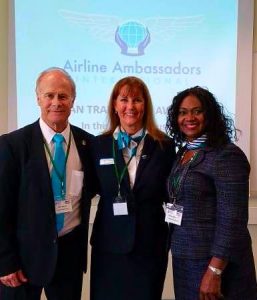
 AAI’s training team included Nancy and Dave Rivard and Donna Hubbard, who presented at Air Baltic Training Center at Riga Airport. Other presenters included experts in the field and workshops in ditching and bomb threat procedures as well as dealing with unruly passengers and even a presentation fron a real hijacker, Julienne Busik.
AAI’s training team included Nancy and Dave Rivard and Donna Hubbard, who presented at Air Baltic Training Center at Riga Airport. Other presenters included experts in the field and workshops in ditching and bomb threat procedures as well as dealing with unruly passengers and even a presentation fron a real hijacker, Julienne Busik.
The AAI team also met with the US Embassy in Riga about the possibility of partnering for a formal Human Trafficking Awareness Training at Riga Airport.
The conference ended just before the night of Midsummer or “Ligo : – the biggest holiday of the year. Everyone goes to the country to share time, have barbecues, and celebrate one another and all life. The girls wear wreaths of flowers in their hair and men wear wreaths of oak leaves and make their own beer and DELICIOUS cheese for the celebration (which is eaten with dates). There are bonfires, music and singing and dancing. The sun does not set until about 10:30 PM and it is dusk till almost midnight. Its fun for the children too, who get to stay up all night on this special night…taking saunas, jumping in the river and over the bonfires. The country was full of culture and music and almost a mid-evil feel…..like the Renaissance it was wonderful to experience the the ancient meaning of Summer Solstice. SEE THIS LINK
Afterwards we delivered 35 colorful T shirts a local orphanage SEE STORY Thank you Angels of Hope!!!
The Report below was compiled by Sandy Dhuyvetter of TravelTalk Media to give AAI training staff and understanding of the challenges and needs of the Latvia government and travel industry in fighting trafficking. Latvia was rated a Tier 2 country by the US State Department.
State Department Compiled by Sandy Dhuyvetter
2013 USA STATE REPORT – Statistics
http://www.state.gov/j/tip/rls/tiprpt/countries/2013/215500.htm
Latvia is a source and destination country for women and children subjected to sex trafficking and a source country for women, men, and children subjected to sex trafficking and forced labor. Latvian women are forced into prostitution in Italy, Ireland, Cyprus, Belgium, Greece, the Netherlands, Finland, the United Kingdom, the United States, and Germany. Latvian men and women have been subjected to conditions of forced labor in the United Kingdom and Italy, and there were reports that Latvian men may have been subjected to forced labor in Germany, Netherlands, Cyprus, Spain, and Sweden. Latvian women in brokered marriages in Western Europe, particularly Ireland, were vulnerable to domestic servitude and sex trafficking. Adult Latvian women are subject to sex trafficking within Latvia. NGOs report that Latvian children were engaged in sex trafficking within Latvia; Latvian children are also vulnerable to child sex tourism in Latvia. Unemployed adults, single women, people raised in state-run institutions, and individuals with mental disabilities remain vulnerable to trafficking in persons. Latvian trafficking victims were recruited into exploitation through employment recruitment companies, social-networking websites, and local connections.The Government of Latvia does not fully comply with the minimum standards for the elimination of trafficking; however, it is making significant efforts to do so. The Latvian government improved victim protection by certifying a greater number and diversity of trafficking victims. The government also increased both the funding for and duration of trafficking victim services. Latvian officials began implementing labor victim identification regulations, but did not initiate new labor trafficking investigations. An international report concluded that proactive victim identification within the country was insufficient. Law enforcement efforts remained the Government of Latvia’s weakest area in addressing trafficking in persons. Even though victim identification increased significantly, Latvian officials investigated or prosecuted very few cases under the anti-trafficking statute. Of the offenders convicted of trafficking, Latvian courts sentenced only a few to prison terms.
Recommendations for Latvia: Greatly increase investigations, prosecutions, and convictions in human trafficking cases; impose criminal penalties on convicted trafficking offenders commensurate with the gravity of the crime committed; use the trafficking statute (Section 154-1 of the Latvian criminal Law) to prosecute trafficking cases involving Latvian victims exploited abroad and domestically; increase efforts to identify victims proactively, particularly victims of labor trafficking and Latvian victims exploited within the country; explore ways to collaborate more closely with other European counterparts so that Latvia is empowered to better protect Latvian trafficking victims abroad and to prosecute their recruiters; ensure that all victims of trafficking, including male victims, receive appropriate accommodation; explore options for long-term victim reintegration; continue to implement new labor trafficking identification guidelines; continue to educate prosecutors and judges about human trafficking and victims’ rights to reduce prejudice in trial; continue to implement the recently designed repatriation mechanism to make state-funded trafficking victim assistance more accessible; continue efforts to ensure that all victims of trafficking are provided appropriate protections throughout the investigation and prosecution of trafficking offenses; continue implementing the 2009-2013 National Anti-Trafficking Program; consider centralizing government anti-trafficking hotlines to enhance trafficking prevention and identification of trafficking victims; update key outreach efforts, such as the government’s centralized anti-trafficking website; continue efforts to systematically monitor trafficking trends; continue promoting trafficking education at schools and increase involvement of NGOs in that training; and increase efforts to raise awareness about both sex and labor trafficking.
Prosecution: The Government of Latvia maintained weak law enforcement efforts against trafficking in persons, investigating and prosecuting few cases under its anti-trafficking statute during the reporting period. Latvia prohibits all forms of trafficking through Section 154-1 and 154-2 of its criminal law, which prescribe penalties ranging from a fine to 15 years’ imprisonment—penalties that are sufficiently stringent and commensurate with those prescribed for other serious crimes, such as rape. The Latvian government amended Sections 154-1 and 154-2 in 2012 to harmonize these statutes with the EU anti-trafficking Directive 2011/36/EU. However, the government continued to use Section 165-1 prohibiting the transfer of individuals for the purpose of sexual exploitation to investigate and prosecute most trafficking cases during the reporting period, claiming that offenses were easier to prove under this law than the trafficking statute. The Council of Europe’s GRETA Report noted that the over-reliance on Section 165-1 to prosecute trafficking offenders may contribute to negative stereotypes about sex trafficking victims. Although the Latvian government claimed that human trafficking declined in Latvia, the Office of the Prosecutor General confirmed that the police lacked the human resources necessary for extensive and sophisticated investigations into trafficking cases. Reports also concluded that Latvian court procedures were lengthy and stalled anti-trafficking efforts. Reports noted that trials in Latvia were difficult for trafficking victims because of repeated interviews and prejudice by judges displayed toward trafficking victims. While the number of trafficking witnesses cooperating with law enforcement increased from 29 in 2011 to 37 in 2012, only seven victims agreed to assist law enforcement during the reporting period. The Latvian government trained officers on human trafficking in a variety of formats. For example, the State Police College offered an investigation course to 142 law enforcement staff members and the Latvian Judicial Training Center briefed 40 prosecutors and 23 candidates for prosecutor positions.
The government reported investigating 17 suspected offenders in 16 new sex trafficking cases, a decrease from 34 offenders in 21 cases in 2011. The government investigated three of these cases under Section 154-1—cases involving sex trafficking to Germany and Cyprus—an increase from 2011, when the government did not initiate any investigations under Section 154-1. Despite NGO reports of labor trafficking to various European countries, the Latvian government did not initiate any labor trafficking investigations in 2012. Latvian authorities prosecuted 12 defendants in 2012, a decrease from 27 defendants prosecuted in 2011; a continued decrease from 39 defendants prosecuted in 2010. Latvian officials charged one defendant under Section 154-1; officials charged the remaining defendants under Section 165-1. In 2012, 19 traffickers received final convictions, including two under Section 154-1, an increase from the 11 who received final convictions in 2011. These figures do not include appealed convictions. As in previous years, Latvian courts sentenced only a few of these traffickers to prison terms. Only three of the 19 convicted traffickers were sentenced to time in prison: two for prison terms of up to three years and one for a prison term of over ten years. The remaining defendants received conditional sentences or a fine. In 2011, two offenders were sentenced to prison terms. Latvian officials extradited two Latvian nationals to Belgium and one Latvian national to the United Kingdom to face trial in sex trafficking cases and collaborated with colleagues in Germany, Greece, the United Kingdom, and Spain to investigate cases involving Latvian victims. Latvian officials prosecuted two alleged cases of trafficking-related complicity in 2012, including one former anti-trafficking police officer tried and convicted for pimping and one former anti-trafficking police officer charged with extortion and other crimes; the prosecution was ongoing at the close of the reporting period. In a third case, officials charged a “sworn attorney” with facilitating trafficking in persons.
Protection: The Latvian government continued to improve its victim protection efforts during the year by increasing the number and diversity of the victims identified and referred to care, increasing the funding provided for certified trafficking victims, and adapting its victim certification procedures to allow Latvian victims to certify while physically outside of Latvia. Nevertheless, proactive victim identification within the country remained weak, and bureaucratic problems with the funding and contracting of victim service provision delayed care. In 2012, the government authorized the equivalent of approximately $126,000 for trafficking victim services, a significant increase from the equivalent of approximately $58,000 in 2011. The government-funded NGO offered every trafficking victim psychological assistance, medical aid, legal representation, housing, and reintegration services. Over the past three years, the funding for victim services has doubled. The increase in funding corresponded to an increase in victim identification and expansion of services offered. The Latvian government certified 25 trafficking victims in 2012, more than double the 11 victims that it certified in 2011; the government funded care for 30 victims in total, including some of those identified in 2011. Twenty-five of the victims receiving care were adult females; five victims were male. One was a victim of domestic sex trafficking. All identified victims were Latvian. During the reporting period, the government extended its victim assistance program to include services for testifying victims and witnesses throughout the entire course of a criminal prosecution, an increase from the prior term of up to six months; all victims and their minor children not benefitting from the prosecution assistance provision were entitled to additional five counseling sessions after completing the rehabilitation program. The government-funded NGO did not operate its own shelter, but collaborated with shelters throughout Latvia to provide services.
Officials from the state police and diplomatic corps referred 22 out of the 30 trafficking victims receiving assistance. The GRETA Report observed, however, that proactive identification by Latvian police within the country remained weak; foreign law enforcement agencies initially referred the majority of the victims to the Latvian state police. The government improved its efforts to identify victims proactively by implementing the 2012 guidance on identifying labor trafficking. In the course of these procedures, the State Labor Inspectorate identified three potential domestic labor trafficking cases and referred those cases to law enforcement; ultimately, law enforcement officials did not confirm human trafficking in any of those cases. The State Inspectorate for Protection of Children’s Rights identified one suspected trafficking case involving a minor. Members of the Latvian diplomatic corps made active use of the Council of Baltic Sea States’ guidelines for trafficking victim identification at embassies and participated in the victim certification process from abroad. The Latvian Ministry of Welfare trained 83 social services staff members on how to identify trafficking cases involving females. The State Border Guards also reportedly employed procedures to identify trafficking victims among immigrant workers in Latvia, including those employed in hotels and construction sites, but did not identify any trafficking victims during spot inspections.
The government reported that it encouraged victims to participate in trafficking investigations and prosecutions by providing witness protection, digital video-enabled courtrooms, and by exempting victims from attending court hearings. Nevertheless, NGOs noted that officials failed to gain victims’ trust or to explain the dangers facing the victims during trial, leaving many reluctant to report to or cooperate with law enforcement. The Latvian government had a residence permit provision available for foreign trafficking victims during reflection periods and for the duration of a criminal trial; however, none of the identified victims during the reporting period were foreign. In order to comply with EU Directive 2011/36/EU, the government amended Section 58 of Latvia’s criminal law to specify that trafficking victims were not liable for criminal offenses committed as a direct result of being trafficked. Nevertheless, NGOs reported that one trafficking victim was charged with pimping.
Prevention: The Latvian government extended its anti-trafficking prevention activities by increasing involvement of the diplomatic corps in anti-trafficking prevention and other measures. Nevertheless, NGOs and the GRETA report stressed the need for continuous, government-funded anti-trafficking awareness campaigns throughout the country. The diplomatic corps, particularly the Latvian embassy in Ireland, was active in anti-trafficking prevention, including greeting Latvian arrivals at the airport in Dublin to offer them information about trafficking, reaching out to orphanages’ principals to explain trafficking, and participating in awareness-raising events at a tourism show. The Ministry of Education and Science continued to incorporate anti-trafficking messages into school curriculum and training, but NGOs were not closely involved in the effort. Several Latvian local governments engaged in awareness raising campaigns, including training, brochures, and mock recruiting interviews to educate youth about risky work abroad; some of these campaigns received private or foreign funding. The anti-trafficking working group continued to meet to coordinate the government’s anti-trafficking activities, alongside civil society members. The government continued to maintain various hotlines for the exchange of trafficking information with the general public, but it did not have a centralized hotline. It was not clear that the various government hotlines were effective in publicizing their anti-trafficking role. NGOs that did not receive state funding for anti-trafficking prevention efforts received more than 115 telephone inquiries on trafficking-related matters. The Latvian government took steps to prevent human trafficking by addressing brokered marriages through awareness efforts and new legislation. The Latvian government reported problems collaborating with some Western European governments, including Ireland, to prevent this exploitation. The GRETA Report concluded that the Latvian authorities’ efforts to reduce demand for the services of trafficking victims were inadequate. The MOI reported investigating and prosecuting a child sex tourism case with foreign defendants. The Latvian Ministry of Defense trained military personnel assigned to missions abroad on identifying trafficking cases and preventing trafficking.
| Anti Trafficking funded by USA in Latvia |
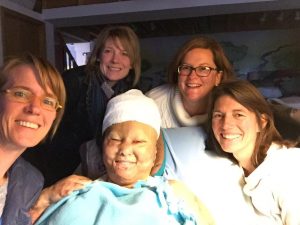 We first met Wushuang Yang (“Wu”) on 30May 2008 when AA flight attendant Sandy Clevenger, who is also an RN, accompanied her from PVG to ORD and on to CVG. Here is her amazing story…..
We first met Wushuang Yang (“Wu”) on 30May 2008 when AA flight attendant Sandy Clevenger, who is also an RN, accompanied her from PVG to ORD and on to CVG. Here is her amazing story…..
Wu was born in November 1996 in FuYang City, Anhui Province, China. In January 2008 tragedy struck Wu, an only child, and her parents. Their house caught fire at night while they were sleeping and Wu was critically burned over 80% of her body. Her mother, who desperately fought to save her little girl, lost her own life in the blaze. In her own words, Wu recollects that day…..”I was curled up in a ball, screaming as the fire was surrounding me. I remember being covered by something. Later, as I was thinking about that day, I realized that it was my mom who covered me with her body. She sacrificed her own life to save mine.” Wu spent the next few months in a Chinese hospital undergoing multiple surgeries and skin grafts. The Chinese doctors told her father that she would not survive. However, with her strong will to live, she was able to come to Shriners to begin her lifesaving treatment.
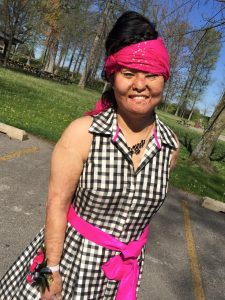 Wu arrived at the PVG airport in an ambulance from her home several hours away. During the long flight she was in so much pain that Sandy had to get permission to administer pain medication. Wu tearfully asked Sandy (through the Chinese speaker) several times if her mother had died. She said she just felt that her mother was gone but nobody had told her. When they reached ORD Wu was again experiencing excruciating pain and was unable to sit on the smaller Eagle airplane to CVG so she and Sandy traveled by ambulance through the night to CVG and Shriners Hospital. She has been a patient at Shriners off and on since that day, traveling back and forth between CVG and PVG several times while she was healing from the 20 plus surgeries she endured at Shriners. Sandy was the one who accompanied her back home to her father the first time. Since then Bunny Doi, ORD F/A, has traveled with her several times and Cathy Brackett, also an ORD F/A accompanied her on one trip. Sandy has since retired, as has Sue Albers who was the AA Operations Manager at ORD on that first trip and was a huge help that night.
Wu arrived at the PVG airport in an ambulance from her home several hours away. During the long flight she was in so much pain that Sandy had to get permission to administer pain medication. Wu tearfully asked Sandy (through the Chinese speaker) several times if her mother had died. She said she just felt that her mother was gone but nobody had told her. When they reached ORD Wu was again experiencing excruciating pain and was unable to sit on the smaller Eagle airplane to CVG so she and Sandy traveled by ambulance through the night to CVG and Shriners Hospital. She has been a patient at Shriners off and on since that day, traveling back and forth between CVG and PVG several times while she was healing from the 20 plus surgeries she endured at Shriners. Sandy was the one who accompanied her back home to her father the first time. Since then Bunny Doi, ORD F/A, has traveled with her several times and Cathy Brackett, also an ORD F/A accompanied her on one trip. Sandy has since retired, as has Sue Albers who was the AA Operations Manager at ORD on that first trip and was a huge help that night.
Over the past eight years Wu has carried with her not only the emotional sadness of losing her mother and being in a foreign country all by herself, but also the heavy burden of many physical limitations. Despite these struggles, she has mastered the English language, has managed to attend high school, and has consistently earned exceptional grades. In late May she will graduate with honors from high school. She has a wonderful, caring group of friends and lives with an amazing host family in Batesville, Indiana. She has done this all with a cheerful, friendly, optimistic, and “can-do” attitude. She truly inspires everyone she meets!
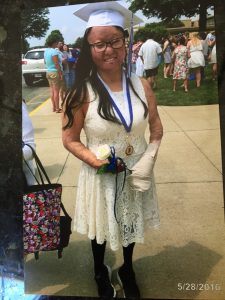 Wu dreams of a career in the medical field and plans to dedicate her life’s work to helping others who are struggling. It is her way of honoring the memory of her mother and the many health professionals that have cared for her. She visited Marian University in Indianapolis and fell in love with the school and the amazing people there who embraced her and committed to being part of her success. It was a perfect fit! Wu was beyond thrilled when she received an acceptance letter from Marian University. Additionally, Marian graciously granted her a scholarship equivalent to 50% of the cost of tuition, room and board for four years. Although this scholarship is substantial, it represents only half of the funding she will need to complete her undergraduate degree. Wu’s father is unable to assist her financially so her “surrogate” moms in Indiana have made it their mission to help make this incredible young lady’s dreams come true. If you, too would like to help, a Go Fund Me page is being set up for Wu and should be up and running in just a few more days. If you have any questions, please let me know. Wu is so very special to me and more than anything else I want to see her succeed. In the meantime you can donate HERE to the Wushang Fund!
Wu dreams of a career in the medical field and plans to dedicate her life’s work to helping others who are struggling. It is her way of honoring the memory of her mother and the many health professionals that have cared for her. She visited Marian University in Indianapolis and fell in love with the school and the amazing people there who embraced her and committed to being part of her success. It was a perfect fit! Wu was beyond thrilled when she received an acceptance letter from Marian University. Additionally, Marian graciously granted her a scholarship equivalent to 50% of the cost of tuition, room and board for four years. Although this scholarship is substantial, it represents only half of the funding she will need to complete her undergraduate degree. Wu’s father is unable to assist her financially so her “surrogate” moms in Indiana have made it their mission to help make this incredible young lady’s dreams come true. If you, too would like to help, a Go Fund Me page is being set up for Wu and should be up and running in just a few more days. If you have any questions, please let me know. Wu is so very special to me and more than anything else I want to see her succeed. In the meantime you can donate HERE to the Wushang Fund!
Sandy Clevenger, Wushangs first escort, attended her graduation….and enjoy pics of reception and graduation below:




